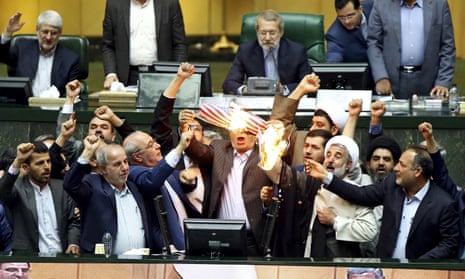Donald Trump’s decision to break with the landmark nuclear deal with Iran was met with defiance in Tehran, where the president Hassan Rouhani said he believed the agreement could still survive – but warned that he had instructed the country’s atomic energy agency to prepare to restart uranium enrichment should the deal collapse completely.
“This is a psychological war, we won’t allow Trump to win ... I’m happy that the pesky being has left the Barjam,” Hasan Rouhani said on national TV, using the Persian acronym for the joint comprehensive plan of action (JCPOA).
Rouhani said Iran would remain committed to the deal agreed in 2015 between Iran and the US, UK, France, Germany, Russia and China.
“From now on, this is an agreement between Iran and five countries ... we have to wait and see how others react,” he added. “If we come to the conclusion that with cooperation with the five countries we can keep what we wanted despite Israeli and American efforts, [it] can survive.
“For 40 years we’ve said Iran always abides by its commitments, and the US never complies. Our 40-year history shows us Americans have been aggressive towards great people of Iran and our region.”Trump’s decision to break with the nuclear deal with Iran and imposition of sanctions was met with dismay by fellow signatories to the agreement, but warmly welcomed by the Israeli prime minister as a “brave and correct decision”.
The French president Emmanuel Macron was the first leader to respond, tweeting: “France, Germany and the UK regret the US decision to leave the JCPOA. The nuclear non-proliferation regime is at stake.”
The US president’s decision to not only “exit” the deal, as he termed it, but to impose economic sanctions on Iran, and “any nation that helps Iran in its quest for nuclear weapons” appeared to put the White House on a collision course with China, France, Germany, Russia and the UK.
Each of those countries have vowed to continue to abide by the JCPOA which they signed with the US, but which Trump described on Tuesday as an embarrassment that would inevitably lead to a nuclear arms race in the middle east.
The EU’s high representative for foreign affairs, Federica Mogherini, urged the Iranian regime not to allow Trump’s move, which was at the most extreme end of the spectrum of US options, to destroy the agreement. She insisted that Brussels expected the rest of the international community to keep to its commitments.
Mogherini said: “I am particularly worried by the announcement tonight of new sanctions … Together with the rest of the international community, we will preserve this nuclear deal.
“Let me conclude with a message to the Iranian citizens and leaders, to each and everyone: ‘Do not let anyone dismantle this agreement. it is one of the biggest achievements diplomacy has ever delivered and we have built this together’.”
Donald Tusk, the president of the European council, tweeted that Trump’s policies would be met with “a united European approach”.
Policies of @realDonaldTrump on #IranDeal and trade will meet a united European approach. EU leaders will tackle both issues at the summit in Sofia next week.
— Donald Tusk (@eucopresident) May 8, 2018
The abrogation on the deal is set to have an immediate impact on the decisions of companies around the world, forcing them to choose between carrying out their business in Iran or in the US.
The EU is faced with the question of how it might protect its companies from possible US sanctions. It is feared that, should EU companies stop business with Iran, the regime could conclude there is no longer any benefit to remaining in the deal, which is designed to limit the achievement of its nuclear ambitions.
The decision is the pinnacle of a disastrous year in EU-US relations. Trump’s defiance in the face of appeals from Macron and the German chancellor, Angela Merkel, over the Iranian deal, follows the president’s refusal to offer the EU a permanent exemption from steel and aluminium tariffs.
They have failed to stop the US abandoning the Paris accords on climate change and have been in strong disagreement with his plan to move the US embassy in Israel to Jerusalem.
The Israeli prime minister, Benjamin Netanyahu along with Saudi Arabia warmly welcomed the move. Describing Trump’s announcment as a “historic move”, Netanyahu said: “Rather than blocking Iran’s path to a bomb the deal actually paves Iran’s path to an entire arsenal of nuclear bombs and this in a few years time”.
An official statement on Saudi-owned Al Arabiya television said: “Iran used economic gains from the lifting of sanctions to continue its activities to destablise the region, particularly by developing ballistic missiles and supporting terrorist groups in the region.”
